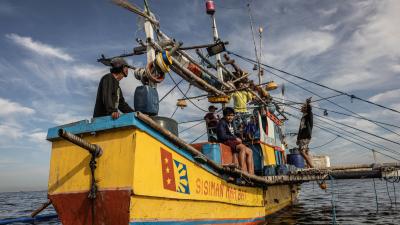Tim Slingsby is Director of Skills and Education at Lloyd’s Register Foundation.

Lloyd’s Register Foundation has recently launched its new strategy for 2024-2029.
Our new strategy focuses on three interconnected priority areas, which are listed below along with their main objectives. To support us in delivering this strategy, we are calling for proposals aimed at enhancing safety across these priority areas.
Priority area objectives:
In our strategy, we are also responding to common global challenges that need collective action. Within our three interconnected priority areas we will make a positive difference across these challenges:
We are particularly interested in initiatives that will scale our impact in any of the following five ways:
Internationalise: Led by local voices, we will make sure that the people most affected have the strongest say in identifying safety problems and finding solutions to make themselves safer.
Influencing others to act: Recognising that change comes through others, resources are targeted to catalyse change at scale, building strong partnerships and creating compelling communications.
Leverage additional resource: Use of our funding to attract resources from others to keep people safer.
A trusted voice in safety: We will find, share and, where needed, commission the best evidence about safety, so that others can act with confidence.
Strengthening our voice in the maritime system for the future: The maritime economy is growing rapidly around the world bringing huge risks and opportunities for safety. Because we have a long heritage in maritime, we have the opportunity to strengthen our collective voice to ensure that this growth is safe, sustainable and equitable.
In line with our “Grant Eligibility and Grant Funding Guidelines,” Lloyd’s Register Foundation does not restrict the types of organisations eligible for funding. However, funding is primarily directed towards, but not limited to, the following types of organisations:
In line with government guidelines, Lloyd’s Register Foundation adheres to the following principles when granting funds to non-charitable organisations:
With a funding pool of £15 million, we aim to support impactful groups or networks who demonstrate relevant expertise and understanding of local, in-country need, particularly within developing economies.
Activity will be focused on an identified challenge or opportunity for change within the three interconnected priority areas and across the global challenges stated above.
We will consider proposals that:
The activity must support our strategic objectives.
Evidence
The Foundation is an evidence-led organisation. Evidence allows us to identify where there is greatest opportunity for change and demonstrates the difference our work has made. A key part of your proposal will be the evidence that supports the specific problem or opportunity that you are asking us to support you with.
What we will not fund:
We want to fund activity that is original. We will not support activity that we are already funding in our major programmes or work that could be more easily funded by others. Lloyd’s Register Foundation will specifically not fund:
To understand our major programmes of work, please see links to current and former projects, including:
With a funding pool of £15 million, we aim to support impactful groups or networks who demonstrate relevant expertise and understanding of local, in-country need, particularly within developing economies in the Global South. It is expected that individual proposals will request up to £1 million.
Should potential applicants have an idea that aligns with any of our priority areas and is worth more than £1m, they are invited to contact us for an informal, exploratory discussion.
Duration of grants is up to 5 years.
We offer access to existing networks of relevant knowledge and expertise and will be eager to work with successful applicants to disseminate and publicise outputs and outcomes of our funding.
For your application to be considered as soon as possible, please submit your proposal summary by Friday 10 January 2025. Due to an overwhelming response, we have extended the decision date on all applications to 21 February 2025.
First you will need to create an account on Flexigrant by visiting the Lloyd’s Register Foundation portal homepage. Once you have created your account you will receive an email to verify it.
Please outline your project's problem or opportunity, the proposed solution, expected impact, key partners, and an indicative budget. We know that you are busy and want the first stage of the proposal to be quick. After you have submitted your proposal summary, we will inform you if you have or have not been successful in progressing to the full proposal phase.
Please note that this call will remain open only until the funding pool is committed. For your application to be considered as soon as possible, please submit your proposal summary by Friday 10 January 2025. Due to an overwhelming response, we have extended the decision date on all applications to 21 February 2025.
If successful, you will be invited to submit a full proposal via our Flexigrant portal.
We need to make sure that your proposals meet certain quality standards, are sufficiently evidenced, are value for money, and have a good chance of success.
The Foundation team will review all the proposals that have passed the review stage and decide on the which proposals we will take forward to contract.
We will contact you informing you of our final decision.